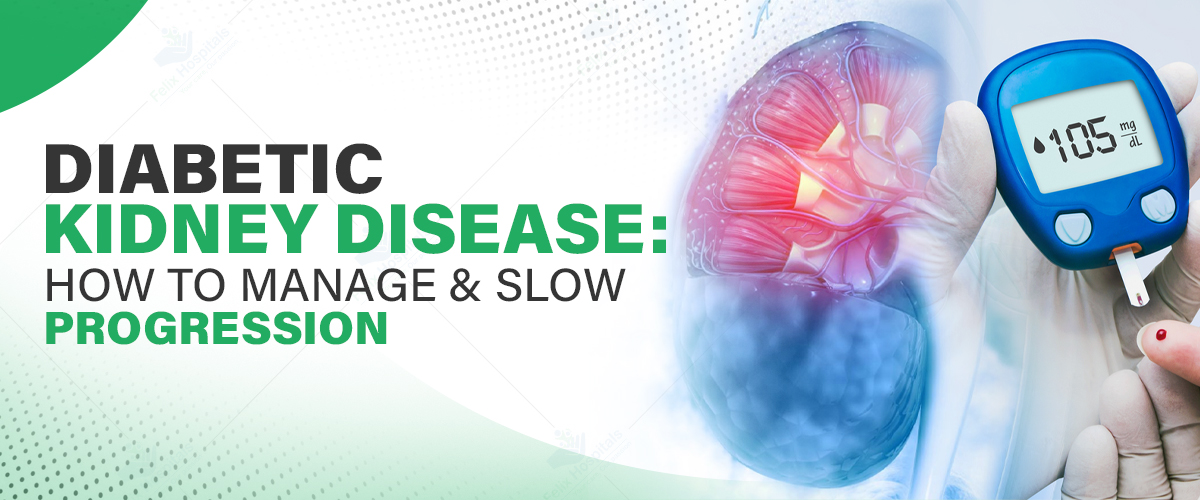
Subscribe to our

The most common diabetes consequence, affecting millions of individuals globally, is diabetic kidney disease (DKD), also known as diabetic nephropathy. Chronic kidney disease (CKD) and, in extreme situations, renal failure are the outcomes of the disease's progressive kidney damage. To cure DKD, the greatest medical care, lifestyle modifications, and early detection are required. To help individuals understand and efficiently manage diabetic kidney disease, we will discuss its causes, symptoms, diagnosis, and therapy in this blog. You can receive individualized therapy and enhance kidney health outcomes by speaking with doctors at the best kidney hospital in Noida if you're searching for professional care.
Take Charge of Your Kidney Health Today! Call now at +91 9667064100 and visit Felix Hospital for professional diabetic kidney disease treatment.
There will be no outward signs of DKD at the start of the course. When the illness first manifests, the following should become apparent:
Chronic diabetes, a hallmark of diabetes, causes DKD. The following are some of the main variables, such as:
It is crucial to recognize DKD early in order to prevent renal failure. The tests that are most frequently used include:
-The albumin-to-creatinine ratio (ACR) is a sensitive indication of kidney impairment that quantifies the quantity of protein in urine.
-Urinalysis: Checks urine for anomalies such as blood, glucose, and protein.
-Glomerular Filtration Rate (GFR): Classifies CKD and estimates renal function.
-Serum Creatinine: Levels are higher when renal function is compromised.
Chronic kidney disease (CKD) cannot be cured, but it can be effectively managed, kidney function can be maintained, and the disease's progression can be slowed down with appropriate diabetic nephropathy treatment. Do the following if your kidney function has declined:
Many CKD patients are prescribed medication to control the cause and complications associated with it. Your nephrologist may prescribe:
If kidney function worsens to end-stage kidney disease, dialysis is necessary to eliminate waste and excess fluid. Two kinds of dialysis:
Hemodialysis:
Peritoneal Dialysis:
A kidney transplant involves replacing a diseased kidney with a donor kidney. Donor types include:
Waiting three to five years is common for a kidney from a deceased donor, but receiving a kidney from a living donor can cut waiting time considerably.
Regular checkups and appropriate medical care are the first steps in preventing kidney disease. Since approximately one in three Americans are at risk of developing kidney disease, prevention and early detection are crucial. Individuals who are at a higher risk of developing chronic kidney disease (CKD) due to diabetes should be regularly screened. Take the following actions to lower your risk:
You may reduce your chance of kidney disease and maintain the healthiest kidneys for the rest of your life by taking these preventive measures.
Diabetic kidney disease (DKD) necessitates expert care and a comprehensive treatment plan. Our nephrologists are committed to assisting patients in achieving optimal kidney conditions and slowing the advancement of diabetic renal disease.
Our nephrologists combine state-of-the-art therapies, lifestyle changes, and continuous monitoring to provide patients with the finest care available for diabetic kidney disease. For individualized care and long-term kidney health, people looking for professional treatment can speak with experts at a famous renal hospital in Noida.
A dangerous side effect of diabetes that can lead to renal failure if untreated is diabetic kidney disease. However, its advancement can be postponed with medication, dietary changes, and early identification. Effective management of DKD requires regular medical checkups, a nutritious diet, regular exercise, and drug adherence. Taking preventative measures is essential if you or a loved one has diabetes in order to protect kidney function and general health.
1. How is diabetic kidney disease distinct from other kidney diseases?
Ans: As opposed to other kidney diseases, diabetic kidney disease (DKD) is caused directly by sustained elevated blood sugar levels, which cause progressive kidney damage due to diabetes. It occurs mostly quietly for years and is usually accompanied by elevated blood pressure.
2. Is diabetic kidney disease reversible if it is caught early?
Ans: Although DKD is irreversible to a certain extent, early detection and effective management—such as control of blood glucose, drug and diet, and lifestyle modifications—can significantly delay its onset and prevent its complications.
3. What dietary changes must I make if I have diabetes?
Ans: A diet that restricts salt, processed foods, and high-protein consumption and emphasizes high-fiber, antioxidant foods such as leafy vegetables, berries, and whole grains is a kidney-friendly diet. A personalized meal plan can be created with the help of a nephrologist or dietitian.
4. How frequently should diabetic patients have kidney function tests?
Ans: Individuals with diabetes must have their kidney function checked every year by doing urine (ACR) and blood (GFR) tests. Individuals with kidney disease or those who are at risk may need more frequent tests.
5. Does high blood pressure make diabetic kidney disease worse?
Ans: Yes. Untreated high blood pressure places extra stress on the kidneys, speeding damage. Treatment of blood pressure with diet modification and drugs such as ACE inhibitors or ARBs is indicated to retard DKD development.
6. Is there a pre-kidney failure warning sign in diabetic patients?
Ans: At early stages, DKD is mute. However, when the disease is progressing, the symptoms such as edema, foamy urine, tiredness, and nocturnal frequent urination are manifestations of declining renal function.
7. Under what conditions should diabetic kidney disease receive dialysis?
Ans: Dialysis is indicated in end-stage kidney disease (ESKD) with diminished functioning capacity to less than 15%. Dialysis or renal transplant must be provided to a patient with severe renal failure.